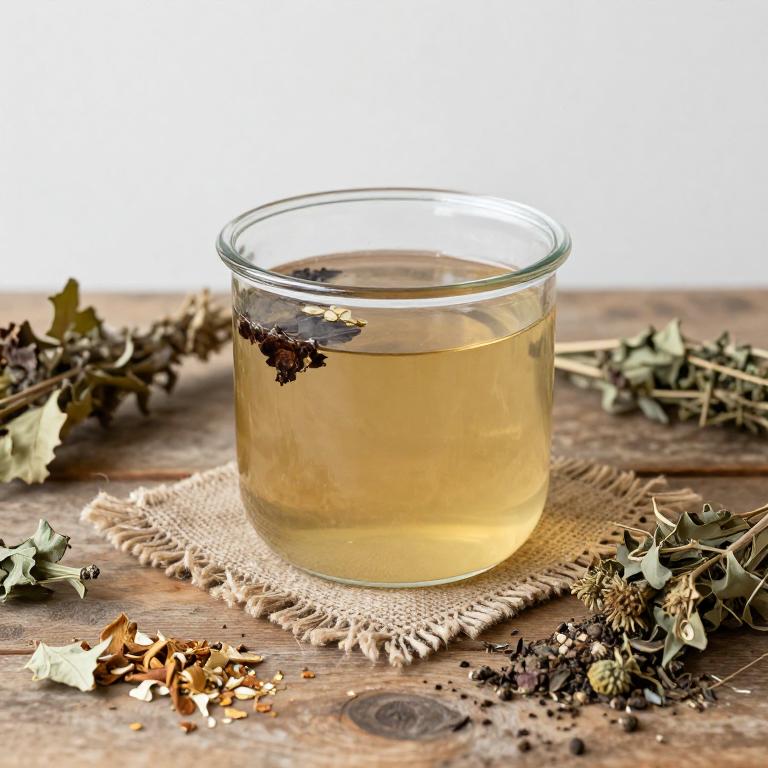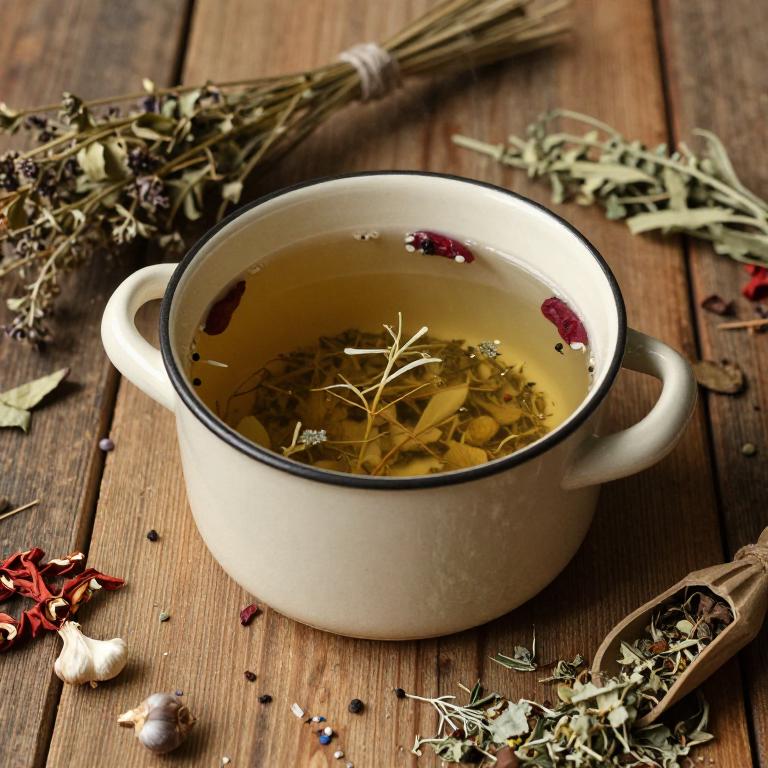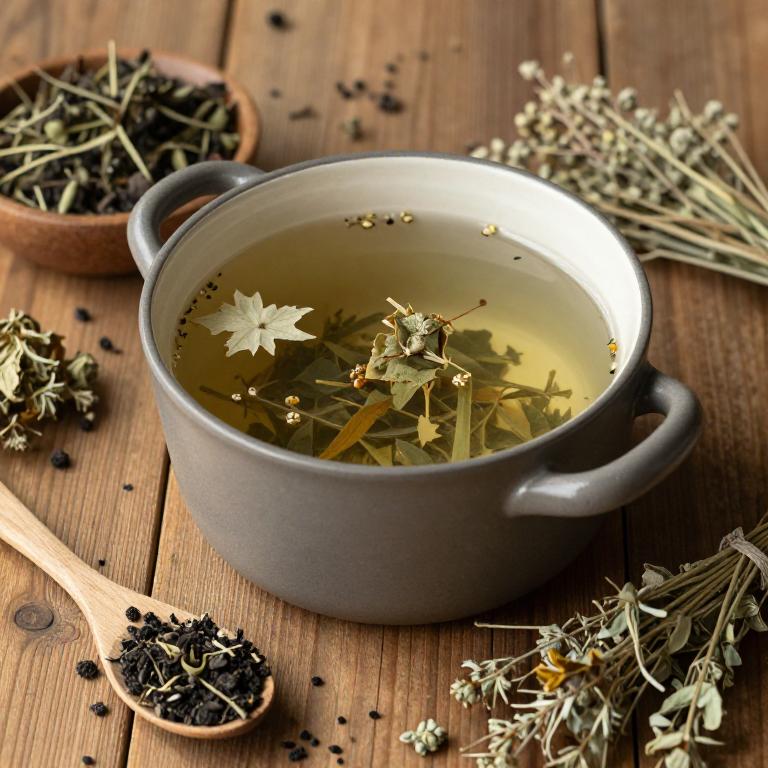10 Best Herbal Decoctions For Heartburn

Herbal decoctions have been traditionally used to alleviate symptoms of heartburn by soothing the digestive system and reducing gastric acid reflux.
Commonly used herbs include ginger, licorice root, and aloe vera, which are known for their anti-inflammatory and antacid properties. To prepare a decoction, these herbs are typically simmered in water for an extended period to extract their active compounds. This natural approach is often preferred by individuals seeking alternatives to conventional antacids.
However, it is important to consult with a healthcare professional before using herbal remedies, especially for chronic or severe heartburn.
Table of Contents
- 1. Licorice (Glycyrrhiza glabra)
- 2. Cumin (Cuminum cyminum)
- 3. Thistle (Silybum marianum)
- 4. Ginger (Zingiber officinale)
- 5. Chamomile (Matricaria chamomilla)
- 6. Dog rose (Rosa canina)
- 7. Stinging nettle (Urtica dioica)
- 8. Common grape (Vitis vinifera)
- 9. Ceylon cinnamon (Cinnamomum verum)
- 10. Fennel (Foeniculum vulgare)
1. Licorice (Glycyrrhiza glabra)

Glycyrrhiza glabra, commonly known as licorice root, has been traditionally used in herbal medicine for its potential soothing effects on the gastrointestinal tract.
Herbal decoctions made from licorice root are often prepared by simmering the dried root in water to extract its active compounds, such as glycyrrhizin and flavonoids. These compounds may help reduce inflammation and neutralize stomach acid, making licorice root decoctions a natural remedy for heartburn. However, long-term use of licorice root can lead to side effects like hypertension and electrolyte imbalances due to its mineralocorticoid-like effects.
As a result, it is recommended to use licorice root decoctions under the guidance of a qualified herbalist or healthcare provider.
2. Cumin (Cuminum cyminum)

Cuminum cyminum, commonly known as cumin, has been traditionally used in herbal medicine for its potential digestive benefits.
When prepared as a decoction, cumin can help soothe the digestive tract and may reduce symptoms of heartburn by promoting healthy digestion and reducing gastric acid reflux. The active compounds in cumin, such as cuminaldehyde and thymol, possess anti-inflammatory and antispasmodic properties that may alleviate discomfort associated with heartburn. To prepare a cumin decoction, whole seeds are simmered in water for several minutes, allowing the beneficial compounds to be extracted.
While some studies suggest that cumin may offer relief for mild heartburn, it is important to consult a healthcare professional before using it as a treatment, especially for persistent or severe symptoms.
3. Thistle (Silybum marianum)

Silybum marianum, commonly known as milk thistle, is a herbal remedy that has been traditionally used for its potential benefits in supporting liver health.
While it is primarily recognized for its hepatoprotective properties, some studies suggest that its bioactive compounds, such as silymarin, may also have anti-inflammatory and antioxidant effects that could help alleviate symptoms of heartburn. Herbal decoctions made from silybum marianum are often prepared by simmering the dried seeds in water, and they are sometimes used as a complementary therapy for digestive discomfort. However, it is important to note that scientific evidence specifically linking milk thistle decoctions to heartburn relief is limited, and individuals should consult with a healthcare provider before using it for medical conditions.
Despite its popularity, more research is needed to fully understand its efficacy and safety for treating heartburn.
4. Ginger (Zingiber officinale)

Zingiber officinale, commonly known as ginger, has been traditionally used in herbal medicine to alleviate symptoms of heartburn due to its anti-inflammatory and carminative properties.
When prepared as a decoction, ginger can help soothe the digestive tract by reducing gastric acid reflux and promoting the relaxation of the lower esophageal sphincter. To make a ginger decoction, fresh ginger root is typically sliced and simmered in water for several minutes, allowing the active compounds such as gingerols and shogaols to be extracted. This herbal remedy is often preferred for its natural and mild effects, making it a suitable option for those seeking non-pharmacological relief from heartburn.
However, individuals with certain gastrointestinal conditions should consult a healthcare provider before using ginger decoctions regularly.
5. Chamomile (Matricaria chamomilla)

Matricaria chamomilla, commonly known as chamomile, has been traditionally used for its calming and soothing properties, and its herbal decoctions may offer relief for heartburn due to their anti-inflammatory and antispasmodic effects.
Chamomile contains compounds such as apigenin and bisabolol, which can help reduce stomach acid production and soothe the gastrointestinal tract. Drinking a warm chamomile tea made by steeping dried flowers in hot water is a popular method of preparing the decoction for heartburn relief. However, it is important to consult a healthcare professional before using chamomile, especially for individuals with allergies or those taking medications, as it may interact with certain drugs.
While chamomile can be a natural remedy for occasional heartburn, it should not replace medical treatment for chronic or severe cases.
6. Dog rose (Rosa canina)

Rosa canina, commonly known as rose hip, has been traditionally used in herbal medicine for its potential benefits in alleviating heartburn.
The decoction of rose hips is prepared by simmering the dried fruit in water, allowing the active compounds such as vitamin C, flavonoids, and essential oils to be extracted. These components may help reduce inflammation and neutralize stomach acid, which can contribute to heartburn symptoms. Some studies suggest that the anti-inflammatory and antioxidant properties of Rosa canina may support digestive health.
However, while it may offer some relief, it is advisable to consult a healthcare professional before using it as a treatment for heartburn, especially if symptoms persist or are severe.
7. Stinging nettle (Urtica dioica)

Urtica dioica, commonly known as stinging nettle, has been traditionally used in herbal medicine for various ailments, including digestive issues such as heartburn.
When prepared as a decoction, the leaves and stems of Urtica dioica are simmered in water to extract their beneficial compounds, such as flavonoids, minerals, and antioxidants. This decoction is believed to help soothe the digestive tract and reduce inflammation, which may alleviate symptoms of heartburn. Some studies suggest that the high content of potassium and magnesium in stinging nettle may support gastric health and neutralize stomach acid.
However, it is important to consult a healthcare professional before using Urtica dioica, as it may interact with certain medications or cause allergic reactions in some individuals.
8. Common grape (Vitis vinifera)

Vitis vinifera, commonly known as the grape vine, has been traditionally used in herbal medicine for its potential therapeutic properties.
Herbal decoctions made from Vitis vinifera, particularly its seeds or leaves, are believed to possess anti-inflammatory and antioxidant effects that may support digestive health. These decoctions are sometimes used to alleviate symptoms of heartburn by reducing gastric acid secretion and soothing the esophageal lining. However, while some studies suggest possible benefits, more clinical research is needed to confirm their efficacy and safety for heartburn treatment.
As with any herbal remedy, it is advisable to consult a healthcare professional before use, especially for individuals with pre-existing medical conditions or those taking other medications.
9. Ceylon cinnamon (Cinnamomum verum)

Cinnamomum verum, commonly known as true cinnamon, has been traditionally used in herbal medicine for its soothing properties.
When prepared as a decoction, it involves simmering the bark in water to extract its active compounds, such as cinnamic acid and eugenol. This herbal remedy is believed to help alleviate heartburn by reducing inflammation and neutralizing stomach acid. The warming nature of cinnamon may also promote digestive health and ease gastrointestinal discomfort.
However, while some individuals may find relief from heartburn symptoms using cinnamon decoctions, it is advisable to consult a healthcare professional before relying on it as a primary treatment.
10. Fennel (Foeniculum vulgare)

Foeniculum vulgare, commonly known as fennel, has been traditionally used in herbal medicine to alleviate symptoms of heartburn.
Its seeds contain compounds such as anethole and flavonoids, which possess anti-inflammatory and antispasmodic properties that may help reduce stomach acid and relax the gastrointestinal tract. A fennel herbal decoction can be prepared by steeping the dried seeds in hot water for several minutes, creating a soothing tea that is often consumed after meals. This remedy is believed to support digestion and may help prevent the reflux of stomach contents into the esophagus.
However, while fennel may offer some relief for mild heartburn, it is advisable to consult a healthcare professional for persistent or severe symptoms.